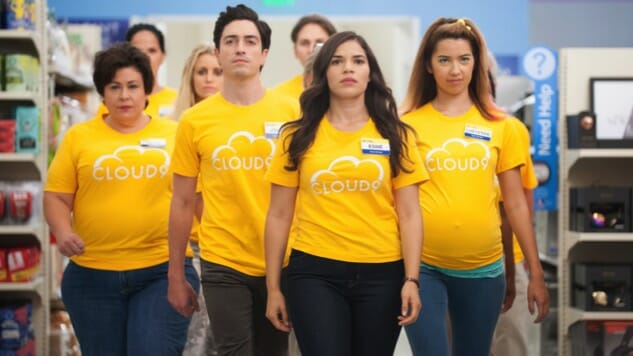How NBC’s Charming Superstore Worked as a Throwback to the Network’s Glory Days

In 2016, it can be tough to remember NBC was once a haven for offbeat comedies that cared about laughs and heart more than Nielsen numbers. It’s only been three years since the Peacock rolled out a slate that included Community, The Office, Parks and Recreation and 30 Rock on a single night, but it feels like an eternity. New comedies are a tough sell (just ask the glut of failed series NBC rolled out in the wake of retiring the giants above), but Superstore, a little show set in a big box store from Justin Spitzer (an Office alum), swam against the current with strength throughout its 11-episode first season.
Superstore is, like many freshman comedies, simple. The premise is familiar—a workplace comedy (this time in the Walmart-esque store, Cloud 9) with a colorful cast of misfits. It shares DNA with many of NBC’s stellar comedies in the post-Friends era and thus Spitzer’s series is not revolutionary, but it succeeds by traversing common territory with bountiful charm and, if you look hard enough, you’ll find more at play than tales from the wacky world of retail.
Cloud 9 and its employees don’t ask viewers for deep investment, but they deserve it. Unlike Community, which thrived on complex scenarios and meta-commentary, or Parks and Recreation’s deft commentary on the American political system and gender dynamics, NBC’s latest is content to offer stories that are easily digestible, whether weekly or in large chunks. In the era of Peak TV, with every new show attempting to find a fresh angle that will hook viewers for years to come, one that is confident in its simplicity, and willing to be (mostly) pure entertainment is refreshing. In that way, Superstore is akin to another preeminent NBC comedy: Cheers.
Though it could break your heart (such as in the Season Three premiere when Coach pleads with Diane to return to the bar in an attempt to quell Sam’s relapse into drinking), and wasn’t afraid to take on the occasional larger issue (as with “The Boys in the Bar,” a first season episode that tackled gay prejudice and stereotypes), Cheers was primarily a show about disparate people finding common ground in a Boston watering hole. In the same vein, Superstore is mostly a show about a group of oddballs stuck in the often unforgiving environment of big box stores, but it too has the ability to be more.
The show is propped up by strong, witty writing that ventures occasionally into more delicate territory. In the series’ third episode, “Shots and Salsa,” floor supervisor Amy (America Ferrera) is embroiled in a heated discussion about race and, specifically, the representation of Latin Americans when the store introduces a new line of salsa. Amy is upset when store manager Glenn (Mark McKinney) obtusely chooses her to hand out samples, further agitated when he chooses the store’s only other Latina employee (Carmen, played by Grace Parra) when she refuses, then enraged when Carmen leans on broad stereotypes to sell said salsa.
Not only is it a smart breakdown of the kind of corporate ignorance that happens daily, but also an interesting portrayal of the variance within cultures on what is seen as offensive. Amy is outraged that Carmen would put on an accent in the goal of furthering corporate interests, but Carmen doesn’t see any issue. The scenario also works as a commentary on the state of diversity on television as a whole. Carmen’s insincere salsa salesperson acts as the typical Latina character you might generally see on a television show, a one-dimensional face written with their race predetermined. Amy, on the other end of the spectrum, represents a new wave of casting in which the best people are chosen for roles regardless of their background, but those aspects (race, gender, sexual orientation) are not lost entirely. Both in the episode, and its mere existence, Superstore illustrates how easy it is to cast in a way that more accurately reflects our society.
-

-

-

-

-

-

-

-

-

-

-

-

-

-

-

-

-

-

-

-

-

-

-

-

-

-

-

-

-

-

-

-

-

-

-

-

-

-

-

-








































